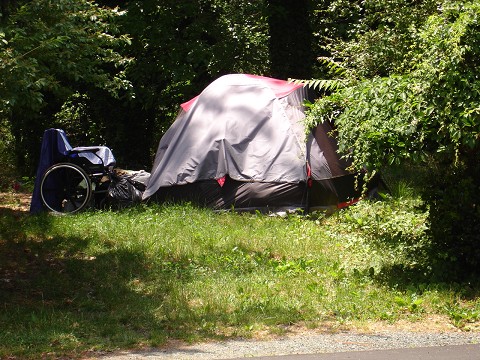The slow poison of a same place

We just visited our friends Mike and Terri Nicholaou in Virginia. They have a neighbor lady with an attitude who presides over her section of the neighborhood with a subtle form of terror. She lobbied the city and had it erect stop signs for no good reason in front of her house. And now she watches the drivers-by like a hawk.
The other day Terri pulled up to the stop sign and her neighbor was standing there watching. Terri rolled down her window. “Did you want something?” She asked.
Her neighbor congratulated her, “Now that was a good stop.”
Terri thought, “I can’t believe your life is so small that you’re worrying about people stopping at a stop sign.”

Such odd behavior makes me ask what caused her to morph over time from a young girl into someone who resembles a kind of a troll under a bridge barking at strangers? And what is it that turns a person into a kind of a Gollum where the thing or place they possess becomes “their precious”?
I believe it’s because of a phenomenon I call “the slow poison of a same place.” Time spent caring for and worrying about a place will eventually corrode our souls, turning us into Citizen Kane trapped in our castle, so that eventually it can be said that we no longer possess it, but it possesses us.
One of the best examples I ever saw of this phenomenon was a neighbor who, rather than allow the bank to repossess her house, blew it up, and years later lives in a tent in front of the ruins. Karen and I drove by her place today and her tent and wheelchair are still there (it’s been more than 20 years).
There is an application of the “slow poison of a same place” to the life cycles of religious institutions, whether they be churches, colleges, or seminaries. One reason institutions die is because of the phenomenon of squatter’s rights. People who stay in one place for a long time begin to grow stale in their thinking. They begin to start generalizing from their limited experience to all of life. They stop acting like stewards and start arrogating to themselves ownership rights they don’t have.
They succumb to the slow poison that has the potential to eat away at any of us who fail to pay attention to Jesus’ words not to worry about stuff or to follow the example of one who had “no place to lay his head.”
Some of us need to look at the places that we’ve been haunting for a while and ask if we could easily give them up, or if perhaps they’ve become little idols. Those of us following Jesus must never allow the sameness of a place to become a source of complacency or to begin to corrode our willingness to do anything for him.
Tomorrow’s blog builds on this theme.
Comments (5)
Leave a Reply Cancel reply
More Posts
![]()



Man, I’m with ya! I love the message because it calls people to action. Its calls people to break away from sedentary lifestyles that consume them in order to pursue the abundant life of just following Jesus. Its time to break the chains!! Thank you for that!
After my parents divorced, I became very used to moving from one place to another. When my wife and I were married, I almost drove her crazy because I thought nothing about us moving at least once a year for our first 7 years of marriage (granted it was during college & seminary days). Now that we have been in the same place for 5 years, I can say that there are several advantages to investing in local ministry in the same place. I shared recently with friends that long-term ministry, for instance 2.5 years compared to 5 years, isn’t just twice as meaningful. Rather, I believe it follows an exponential curve.
However, I would also agree that at some point a person reaches his or her apex, and once the decline has begun, he or she may need to begin considering a new place or ministry. But… there are many peaks and valleys over the years. So one shouldn’t see every decline as inspiration for ministry relocation.
As one mentor and friend told me during the ordination process, “never judge your ministry by your pulse.” If things seem out-of-this-world-wonderful, they may not be as good as you think. And if it seems like nothing at all is working, it’s probably not as bad as you think.
Seth, I appreciate your post. I believe my thoughts are mostly responding to the widespread syndrom of ministers failing to stay anywhere long enough to make a difference in the lives of people who are settled. And I believe we are certainly all called to different types of service. I’m reminded of the joke, “How many youth ministers does it take to change a lightbulb?” Answer: “No one knows. They never stay long enought to change one.” I am very grateful for being where I am long enough to change a lightbulb or two. I hope others will embark on this sort of invested ministry too.
By the way, I tend to be more comfortable moving from one new adventure to another. (Remember Kevin Costner in Water World? Dry land “didn’t feel right, no movement.”) Staying settled has a fresh challenge and growing experience for me.
Excellent point, Scott. Let the pendulum swing too far in the direction of a peripatetic ministry, and you fail to develop covenantal relationships. This is worthy of a blog! Thanks.
seth
So many great applications to your message today. I think our families’ many moves have helped with this possession thing, yet I know we’ll always struggle. As I spend my life now in an academic institution, your “slow poison of the same place” analogy hit home. Mind if I share it with my dean? And thanks for your prayers. I found myself praying for you today anew.
Seth, I found your blog! A concept God has continually been trying to teach me. lol